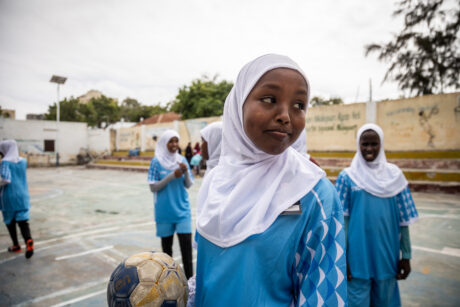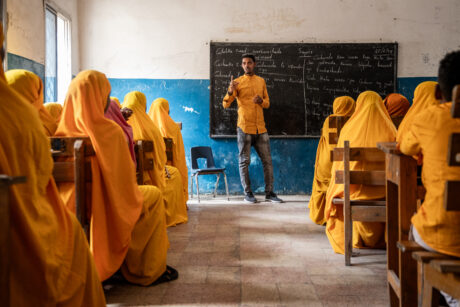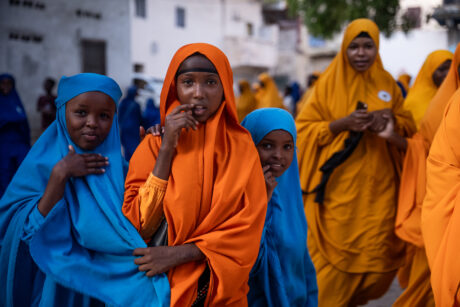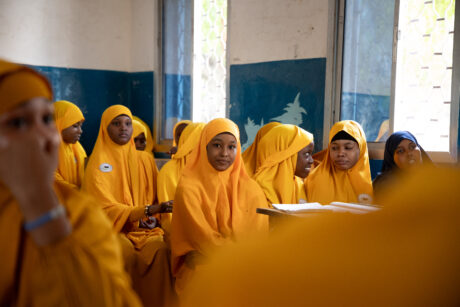Desde muito jovem, Amran Abukar Ali ansiava por ir à escola. Mas como o filho mais velho, Amran dependia de ajudar no sustento da família.
Quando as secas dizimaram a área onde a sua família vivia numa pequena quinta na aldeia de Buraley, A família de Amran procurou melhores oportunidades e mudou-se para Walaweyn, 15 quilômetros ao sul.
Ela, sua mãe e irmãos se estabeleceram em um centro para pessoas deslocadas internamente (Deslocados internos) acampar. Eles sobreviveram com os ganhos diários que sua mãe ganhava através de empregos temporários. Como único pai e ganha-pão da família, A mãe de Amran, Sharifo, teve que colocar a filha para trabalhar. Amran começou a fazer tarefas domésticas para outras famílias para contribuir com a escassa renda da família.
A educação é altamente valorizada na cultura somali, mas pais como Sharifo enfrentam circunstâncias económicas precárias, forçando-os a fazer compensações difíceis.
Enquanto procurava trabalho no bairro, Sharifo ouviu um grupo de pessoas contar à comunidade sobre um novo programa educacional chamado Barra ou Barra (Ensine ou Aprenda), um programa de educação básica acelerada de cinco anos financiado pelos EUA. Agência para o Desenvolvimento Internacional. Ela aprendeu que Bar ama Baro (BAB) ofereceu aulas e materiais sem custo para os alunos, e que o programa visava capacitar crianças que não frequentam a escola, como a sua filha, com a oportunidade de se atualizarem e de se matricularem no sistema escolar formal.
Apesar dos desafios enfrentados por muitos pais somalis, Sharifo decidiu desistir de pedir à filha para trabalhar. As aulas gratuitas foram uma oportunidade que ninguém deixaria passar.
Finalmente na idade 13, Amran pôde começar seus estudos.
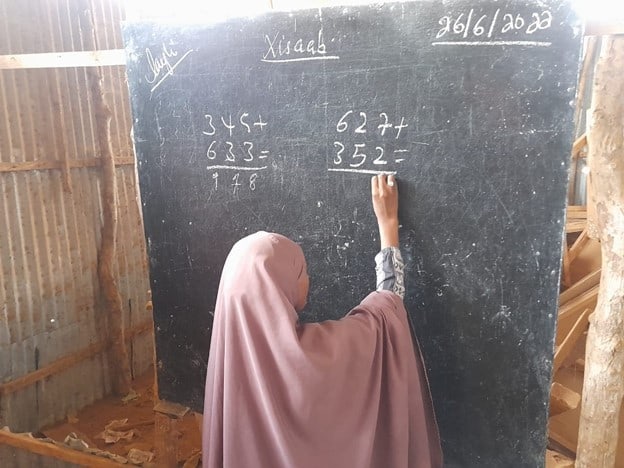
“Não tive oportunidade de estudar na minha infância,”Sharifo diz. “Estou muito feliz que um dos meus filhos tenha a sorte de receber esta educação gratuita e, esperançosamente, Poderei inscrever o restante em breve.”
Amran é um dos mais de 100,000 alunos matriculados no programa de educação básica acelerada do BAB desde o início do projeto, há dois anos.
Cerca de dois terços das crianças e jovens em idade escolar na Somália não estão matriculados na escola, tornando programas como o BAB críticos para a expansão da alfabetização no país. O programa condensa um ciclo primário típico de oito anos em quatro anos. Isso permite que crianças entre nove e 17 para se atualizar e ingressar no sistema escolar formal ou obter um certificado de escola primária por meio de um processo de exame reconhecido nacionalmente.
Trabalhando com o Ministério da Educação, Cultura, e Ensino Superior, e Ministérios da Educação dos Estados Membros Federais, BAB treinou 130 formadores de professores, que por sua vez treinou 2,700 professores e diretores de educação básica acelerados em 460 escolas em 31 distritos sobre como trabalhar com os alunos e outras dicas para o sucesso em sala de aula.
O programa BAB também imprimiu e distribuiu 772,000 cópias de materiais de ensino e aprendizagem para alunos e professores.
“Aumentar o acesso à educação é uma prioridade estratégica para o Governo da Somália, e o Dia Internacional da Alfabetização é um momento para enfatizar a importância de aprender a habilidade fundamental da leitura,” disse o Ministro Farah Sheikh Abdulkadir. “Valorizamos a nossa parceria com a USAID, o que permite que mais crianças somalis tenham acesso a serviços de educação de qualidade.”
Ao iniciar seu segundo ano, BAB expandiu para 20 novos distritos, tornando o total dos distritos-alvo 32 incluindo áreas urbanas e rurais. O projeto está empenhado em matricular crianças e jovens fora da escola em áreas de difícil acesso.
“Bar ama Baro está apoiando o governo da Somália para atender às necessidades da grande população fora da escola no país”, disse Faiza Hassan, Chefe do Partido. “Juntos continuaremos a expandir o sistema de educação pública da Somália para que todas as crianças tenham a oportunidade de aprender.”
Bar ama Baro leva o nome de uma pessoa querida, em todo o país, campanha de alfabetização voltada para serviços cívicos lançada na década de 1970. Aproveitando esse rico legado, a combinação deste programa de prestação de serviços, apoio político, e o fortalecimento dos sistemas está apoiando a melhoria do currículo, maior capacidade, alcance estendido, e apoios de aprendizagem reforçados para crianças com mais idade e que não frequentam a escola na Somália.
“Os Estados Unidos têm orgulho da parceria com a Somália para criar oportunidades para os jovens,” disse Larry E.. André, Júnior, NÓS. Embaixador na Somália. “A leitura abre oportunidades de aprendizagem e ganhos ao longo da vida. Em última análise, os investimentos na educação ajudarão a garantir uma economia próspera., futuro pacífico para a Somália.”
O sucesso do projeto pode ser medido não apenas pelo impressionante número de matrículas e pelo número de professores treinados., mas também através das vozes dos seus alunos do ensino básico acelerado, como Amran, a quem está a ajudar a criar um caminho para obter um certificado de ensino primário e ingressar no sistema escolar formal ou procurar continuar a sua educação através de estudos profissionais e pós-secundários.
Amran está emocionada por estar na escola e suas aulas são sua principal prioridade. Ela é uma inspiração para seus irmãos mais novos, que agora querem ir para a escola, também.
“Eles sempre vêm até mim quando estou lendo meus livros e tentam ler também. Inicialmente, eles não conseguiam entender nada, mas agora eles entendem muito e mal podem esperar para ir para a escola e comprar seus próprios livros,”diz Amran sobre seus irmãos.
Sharifo está orgulhosa da diligência de sua filha e de como o exemplo de Amran despertou o amor pela educação dentro da família.
“Meus outros filhos agora estão me pedindo para mandá-los para a escola, porque como Amran, eles também querem poder ler e fazer cálculos matemáticos. Eu prometi a eles que iria matriculá-los no próximo ano,”diz Sharifo.
Amran completou seu primeiro ano no Bar ama Baro em maio, e diz que espera passar nos exames com louvor.
“Meu sonho é frequentar a universidade e me tornar professora de inglês para ajudar a erradicar o analfabetismo do meu povo, especialmente aqueles que são de famílias pobres,”ela diz.
As comunidades e os pais desempenham um papel crucial no apoio à educação de uma criança. O BAB ajudou a criar e apoiar comités comunitários de educação para ajudar a conectar crianças e jovens que não frequentam a escola com as oportunidades oferecidas através do projecto e do programa de educação básica acelerada do MOECHE.. Os comitês serão uma parte crítica para manter as crianças matriculadas no decorrer do ano letivo.
“A educação de Amran e seu futuro são muito mais importantes do que qualquer outra coisa agora,”Sharifo diz. “Não quero distraí-la de assistir às aulas ou estudar.
Agora, quando Amran está em casa, sua mãe diz que ela tem toda a liberdade necessária para ler seus livros e fazer suas tarefas, Sharif diz.
